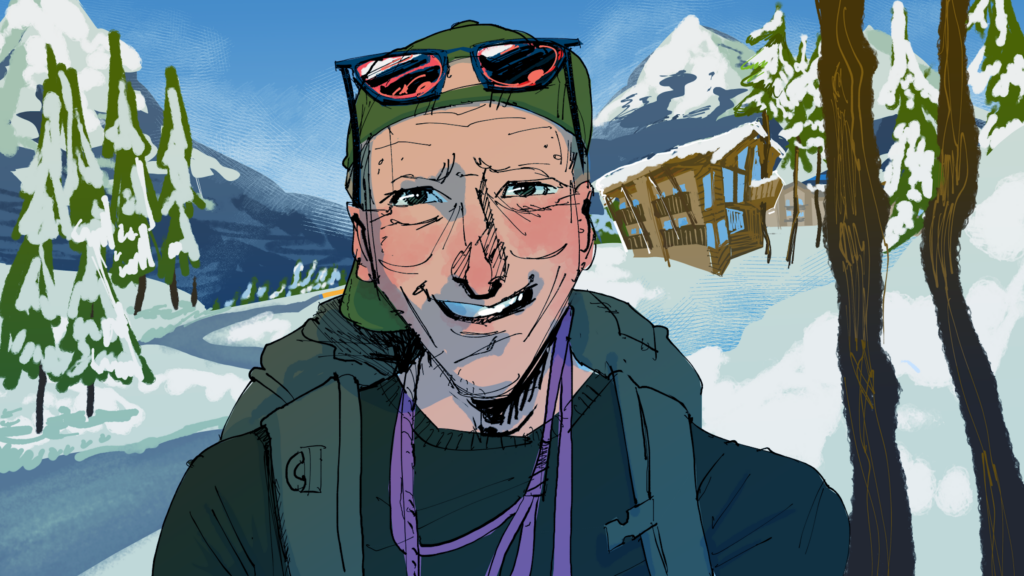No products in the cart.
Outdoor Adventure
Can High-End Tourism Help the Environment?
For a decade now, the man trying to figure out how his South Lake Tahoe hotel lost power this morning has been telling anyone who might listen he’s not a billionaire.
The rumors began even before 2013, when Belkin—the company Chet Pipkin launched on his parents’ dining room table in 1981, by handmaking cables to connect printers to newfangled personal computers—bought Linksys, the brand behind the ubiquitous WiFi routers. “Pipkin is now officially a billionaire,” one financial publication soon reported, a declamation Forbes subsequently co-signed.
Just four years later, the Los Angeles Business Journal more than doubled that net-worth estimate, naming Pipkin the city’s 29th wealthiest person, lording over $2.5 billion. “People prefer to report it that way, no matter what I say,” he told me, laughing. “But I’ve always stayed south of that.”
Just after dawn on a cold Monday morning in late November, Pipkin certainly did not comport with our popular conceptions of billionaires—powerful, aloof, maybe erratic, at least vaguely authoritarian. (While we’re here, no, Pipkin’s never met Elon Musk, who has now stood him up three times.) Instead, less than 30 minutes after the power disappeared at the Desolation Hotel, the humbly luxurious place Pipkin opened in August 2022 a few hundred yards from Lake Tahoe’s southern shore, he wheeled into the parking lot, having rushed from his nearby Nevada home the moment he heard the news.
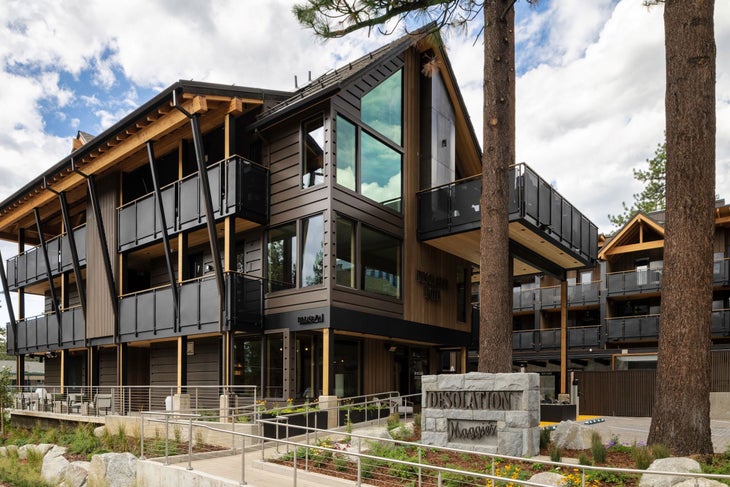
Huddling with a manager and the maintenance crew, he flitted from one corner of the property to another, staring up at power lines and peering down at electrical boxes, trying to diagnose the problem. His white lab, Harriet, followed. When word came hours later that the problem was at a nearby power station and 23,000 people were without electricity, he stuck around, anyway, standing with his team on the sidewalk, hands stuffed deeply into a pocked old puffy. They brainstormed ideas, like where they might stow a backup generator in the weeks to come. Pipkin nodded along; winter, after all, was coming to Tahoe.
“We don’t do it because it’s easy. We do it because it’s important.”
“I wanted the staff to feel empowered. I like to let people do things themselves, to figure it out,” he said later, summarizing the management style that turned him into a self-made near-billionaire with the offhandness of someone ordering a deli sandwich. “But if they want my help, I want to be around.”
The Desolation Hotel is the synthesis of Pipkin’s 40 years of experience at Belkin and the fortune it generated. A sleek assemblage of tall black buildings with blonde wood accents, all flanked by lodgepole pines, it is a northern Sierra jewel. Three-story townhomes boast two soaking tubs, two fireplaces, heated bathroom floors, and a small kitchen appointed for a demanding home chef. Each unit includes a fleet of Belkin chargers and gadgets, a high-end hair dryer, and a set of automated skylight shades. The place appears exported from a digest of Scandinavian architecture; rooms start at $300 a night, and recent guests include a Kardashian compatriot, tech heavyweights, and television stars.
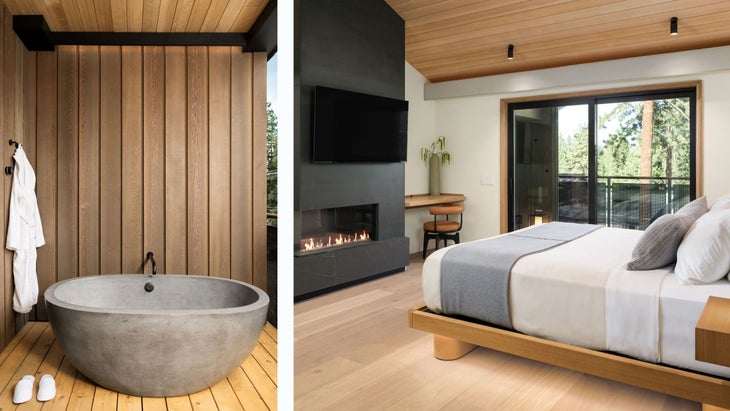
But for decades, Pipkin has also been an ardent nonprofit advocate, active on so many boards of directors he struggles to recount them all. And for years, he has been a volunteer with the U.S. Forest Service, directing visitors through the sprawling national forest he lovingly refers to as the hotel’s “backyard.”
So, through Desolation’s less sexy elements, he hopes it can become an exemplar of what ostentatious hotels that abut the wilderness might become. The porous pavement helps keep Lake Tahoe famously blue by preventing runoff. In spite of the morning’s panic, hidden solar panels power much of the place, and the hotel represents the region’s largest concentration of electric vehicle chargers. Those skylights are made to save electricity, as are power switches that only work when a room key is inserted into the wall. A local nonprofit plants a tree for every night someone stays at Desolation, a ratio Pipkin wants to up.
This, Pipkin believes, is a locus for moneyed tourists who can witness the region’s splendor and spend in a way that benefits it. After stepping down as Belkin’s CEO in January 2021, that’s the kind of help Pipkin, 62, wants to offer the world—starting, at least, with Lake Tahoe. “How do we do the right thing for the people who live here? How do we do the right thing for the environment? And how do we give people access to all of the gifts that are here?” he said in the hotel’s tiny restaurant, Maggie’s, with Harriet at his feet.
“I believe all three can and need to be accomplished here,” he continued. “We don’t do it because it’s easy. We do it because it’s important.”
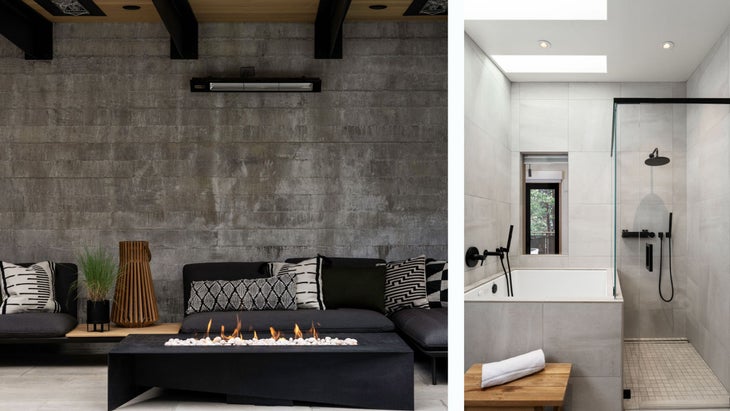
Pipkin is the endpoint for a very specific American archetype: the kid of California immigrants whose parents came west looking for wealth and, a generation later, actually found it through him.
His father and namesake, Chester, was one of 18 children in Oklahoma, the son of a restless man, who wasn’t around much. So poor his father often stole milk to feed the family, they’d shuttle between north Texas and the southern edge of Oklahoma by horse-drawn wagon, eking out a slim existence. The family so epitomized the region’s hardscrabble ethos that Pipkin’s great-aunt, a folk-singing roughneck named Myra, is purported to be the inspiration for John Steinbeck’s Ma Joad. (Pipkin learned this while at Belkin, after spotting her in a National Geographic spread about the Dust Bowl.)
Things may have been harder still for his mom, Lorraine, in the North Dakota town of Williston. She was bullied for her unmarried parents; as a child, her little brother drowned while her mom worked. She refused to return to the town with Chet decades later. “There’s nothing there,” she told him, “except too many ghosts.”
“We have to close the opportunity gap, so that those of us with less are closer to those of us with more. The single best tool—and there is no close second—is education.”
The pair met in California after their first marriages failed, both divorces casualties of World War II. They were machine operators and machinists, a job his father kept, eventually working on the Saturn rockets that lifted Apollo to the moon. The third of four children, Chet was a natural hustler whose first gig was washing dishes at his Lawndale High School in exchange for lunch. He mowed lawns, made candles, started a rent-a-Santa Claus service, and tried to turn gas-station coupons into real currency, all before he graduated high school.
“Any time I was working for other people, I continually came up with what I thought would be a much better way. I would present these concepts,” Pipkin told me, grinning mischievously, a month after that power outage. It was a sunny day in a wealthy beach town near Los Angeles, and he hesitated. He finally laughed. “No one ever took on any work from me, so I said, ‘This is bullshit.’ I can do this better, so I am not going to be constrained by other people.”
The idea came during his first year at UCLA, as he was pondering what his generation’s technical revolution would be—that is, the steam engine or automobile of the late 1970s. “Right away, I thought it was personal computers,” he said. He dropped out, read magazines, and lurked at computer shops, brainstorming and discarding dozens of notions. “People were coming in for solutions, and these stores were just selling boxes of stuff that didn’t work together,” he remembered. “I knew I could figure it out.”
As Belkin began and then ballooned, Pipkin fostered a parallel life in the nonprofit world. Following that lunchroom dishwashing stint, his second paying job had been as a day-camp counselor for the YMCA, an organization that had already changed his life. As a kid, that’s where he learned to swim, camp, and, through a program that mirrored the popular Model UN, lead. He took kids from backgrounds not altogether dissimilar from his on mountainside camping trips, work that often put him in the company of educators he found inspiring. He listened to their ideas.
“The environment is first, because otherwise we aren’t going to be around,” he said, outlining the priorities he had for his nascent profits. “But then we have to close the opportunity gap, so that those of us with less are closer to those of us with more. The single best tool—and there is no close second—is education. That became crystal-clear.”
For years, he tried the relatively easy philanthropy route: funneling money to schools in hopes it would fix every problem. Such donations failed. About 15 years ago, new research convinced Pipkin and a group of partners that they actually needed to start schools that enhanced student-teacher relationships by increasing resources, decreasing class size, and focusing on the kids’ skills. There are now five such Da Vinci schools he co-founded, with nearly 3,000 alumni. “We just implemented what the data said,” he told me, eyes glowing, “and magic started happening.”
When Pipkin stepped away from his CEO role at Belkin in January 2021, he helped the company launch its own five-year school on its campus outside of Los Angeles, an initiative long in the works. Again with small classes and intimate relationships, these Portal Schools connect high-school students with real-world opportunities at nearby companies—the kind of experience Pipkin longed for as a teenager, dreaming of his own inventions. Subsidized by the company itself, tuition still isn’t cheap, but the program is designed in part as a pipeline for California tech jobs, including, of course, those at Belkin.
“Chet had one very simple insight early on—to not count his chips at the table and focus on being the good person his family raised him to be,” Mikel Jollett, the Airborne Toxic Event singer and memoirist, told me. When they met in the nineties, the teenaged Jollett faced extreme hardship with his own family. Pipkin has been his mentor for almost 30 years.
“We think cartoonish success should turn you into something,” he said, “and Chet decided it wasn’t going to. That’s very rare, and it’s very real.”
Pipkin frequently invokes a parable called “The Star Thrower,” first published when he was a child. In the much–adapted tale, someone who’s not yet cynical plucks starfish washed onto the beach from the sand and flings them into the ocean, saving them one by one. Since there are too many to rescue, an onlooker wonders, why bother? Pipkin insisted his work is not only about the life he’s changing but also about the example he might set by doing it at all.
“It’s very important for me to live that change from the ground up, to understand and appreciate it,” he said. “And then use an open-source model. Whatever good we happen to be doing by luck or accident, we want it to be transferred to the rest of the world.”
The morning after Pipkin celebrated his 62nd birthday with his family and the Desolation staff at Maggie’s, their pack of polite dogs underfoot at the crowded table, he returned to the hotel at 8 A.M. sharp. We had plans to climb a mountain.
Pipkin met his wife, Jan, when they were still teenagers, doing volunteer work. When they were 19, they got a cheap room at the Mark Twain Lodge, a two-story spot that still stands blocks from the lake. Pipkin was blown away by what he called “one of the finest bodies of water in the world, a fragile gem.”
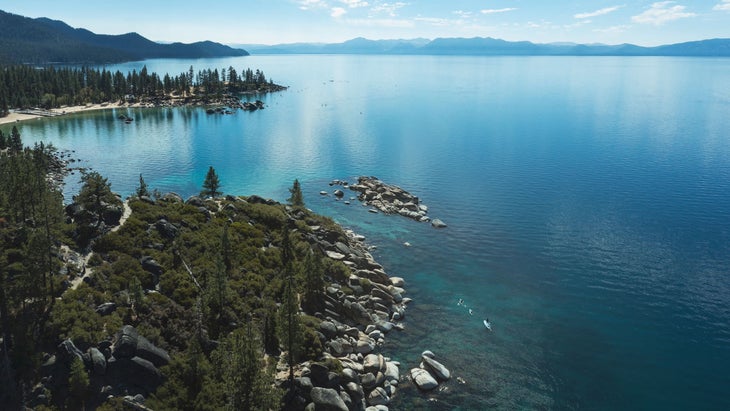
As the young couple had kids, family escapes to Tahoe increased. At least some of the kids would disappear into the woods with their dad, finding novel ways up the northern Sierra slopes. One of their seven children, Spencer, has become a rather serious climber, just a few weather windows shy of the Seven Summits. He fell for mountaineering on summertime hikes of Mount Tallac, one of the highest peaks around Tahoe, with his father. When they proposed a winter ascent, Chet’s first, I quickly agreed.
The mission was a tryout of sorts for Spencer, too, and Desolation at large. In seasons to come, the hotel hopes to offer comprehensive guide services to guests, whether that means slowly canoeing the lake or hiking the Desolation Wilderness or pushing up Tallac in deep powder. With its wood-lined private sauna, ever-steaming hot tub, and heated saltwater pool, Desolation is intended as a launching point for such excursions and a living recovery room for mountain workouts. Spencer, who now manages the hotel’s social media accounts, is the well-ventured shoo-in for the position. “Great guiding, Spencer, great route,” Chet shouted so much from the rear of our party of four that, by day’s end, it seemed the son needed a new business card.
As we perched on boulders at the summit, sharing coffee and petting Harriet, Chet was exhausted but verklempt, proud that this piece of his plan also seemed possible. Desolation might be able to show people its backyard, after all.
“We don’t think anything at Desolation is the end-all, be-all. It’s the start of a journey. It’s going to get better.”
Pipkin remains the same tinkerer who tried renting Santa Clauses as a teenager, then found his fortune making better cables for existing hardware, then opened schools to try alternative educational models—always iterating, forever searching for that better version. He is the first to admit that Desolation, despite its Instagram-flex details and celebrity guests, is not perfect.

“All this kind of work, it’s all a pilot. We know we don’t have it right,” he said, speaking of both hotel and high school at once. “We don’t think anything at Desolation is the end-all, be-all. It’s the start of a journey. It’s going to get better.”
To wit, Pipkin originally hoped the hotel would be a series of treehouses, each suspended high in the pines, leaving the ground itself bare; the dream died quickly, killed by fire codes. He subsequently hoped to cloak the entire building in solar panels, so the structure powered itself and then some; the architects squashed that one. (As if in recompense, Pipkin beamed when talking about his advisory work with Seattle’s Sustainable Living Innovations, which recently opened the world’s first “net zero high-rise apartment building.”)
He lamented the environmental footprint of luxury touches, like the stylish propane flames around the pools or lavish robes that need to be laundered often. And he grimaced as he admitted the starting wage is $18 per hour, $2.50 higher than the new California floor. “It’s not livable enough,” he said, frowning. “I’m curious to see what the business model can look like with $21.”
Still, what they have accomplished is remarkable. When Pipkin and his younger brother, Eric, bought Tahoe Villa, the spread of ramshackle apartments where the Desolation sits now, they gave each resident at least six months of notice before demolition began and a large moving stipend. They even housed several tenants themselves. Just before snowfall arrived in 2021, his team paused construction for an entire week for a Halloween fundraiser that generated more than $100,000 for area firefighters.
What’s more, the new business and the fees it pays represent a boon to efforts to protect the Tahoe watershed and its sightlines, according to the Tahoe Regional Planning Agency (TRPA), the multi-state organization tasked with regulating local development. The area’s increased regulations have prevented most big-money developers from upfitting the area’s squat, homely old hotels, explained the TRPA’s information officer Jeff Cowen. Projects like the Desolation, powered by Pipkin’s near-billion, represent a new frontier of business that’s beneficial to the place itself.
“The fees they pay,” Cowen told me, “are distributed to local governments to buy private land in a sensitive area, some place that needs to conserved. They can turn it back into an open space, in perpetuity.”
Pipkin knows, of course, that the Desolation Hotel and rooms that can run to nearly a grand cannot be for everyone. The aim, though, is to wield a space and experience that a few can afford as a tool that does benefit everyone. He calls this compassionate capitalism, a much-debated concept during the last decade about making money and using it in a responsible way. But for Pipkin, that attitude seems less of a studied philosophy than a lifelong condition, an essential quality that almost becoming a billionaire didn’t corrode.
“We hope that this is an inspiration for others about how this can be done—not cookie-cutter development only focused on a bottom line and a capacity, but a sensitivity to the setting and the environment,” he said. “We’re not afraid of being copied. We would love to be copied.”
Source link

